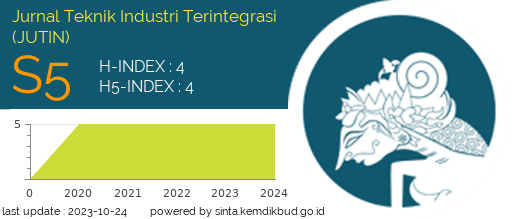Klasifikasi Menggunakan Metode Random Forest untuk Awal Deteksi Diabetes Melitus Tipe 2
DOI:
https://doi.org/10.31004/jutin.v7i3.26916Keywords:
klasifikasi, Random Forest, diabetes, pembelajaran mesin, kecerdasan buatanAbstract
Type 2 diabetes mellitus (T2DM) is a chronic disease with increasing prevalence. Early detection of DMTP2 is crucial in managing and preventing this disease. In this study, we propose the use of Random Forest method for early classification of T2DM based on risk factors. The dataset was obtained from UPTD Puskesmas Jatiroto with a total of 1111 data with 6 attributes of DMTP2 factors and 1 label. In the pre-processing stage, initial data processing includes cleaning missing values, feature engineering, and separation of training and test data. Next, the Random Forest model is trained using data that has been validated using K-Fold Cross Validation. Experimental results show that the proposed model produces an average accuracy of each fold of 97%. The final stage of evaluating the model by calculating precission, recall, and F1-Score, respectively, obtained results of 95%, 97%, and 96%. Model evaluation focuses on predicted labels so that the model can predict well in the case of DMTP2 problems based on similar data configurations.References
A M E R I C A N D I A B E T E S A S S O C I A T I O N STANDARDS OF MEDICAL CARE IN DIABETES-2018. (2018). THE JOURNAL OF CLINICAL AND APPLIED RESEARCH AND EDUCATION, 41. www.copyright.com
Al-Jaroodi, J., Mohamed, N., & Abukhousa, E. (2020). Health 4.0: On the Way to Realizing the Healthcare of the Future. IEEE Access, 8, 211189–211210. https://doi.org/10.1109/ACCESS.2020.3038858
Breiman, L. (2001). Random Forests (Vol. 45). https://www.stat.berkeley.edu/~breiman/randomforest2001.pdf
Cahya, E., Witjaksana, P., Rohmat Saedudin, R., & Widartha, V. P. (2021). PERBANDINGAN AKURASI ALGORITMA RANDOM FOREST DAN ALGORITMA ARTIFICIAL NEURAL NETWORK UNTUK KLASIFIKASI PENYAKIT DIABETES.
Dr. Suyanto, S. T. , M. Sc. (2017). DATA MINING UNTUK KLASIFIKASI DAN KLASTERISASI DATA. INFORMATIKA.
Dzakiyullah, N. R., Burhanuddin, M. A., Ikram, R. R. R., Ghani, K. A., & Setyonugroho, W. (2019). Machine learning methods for diabetes prediction. International Journal of Innovative Technology and Exploring Engineering, 8(12), 2199–2205. https://doi.org/10.35940/ijitee.L2973.1081219
Dzakiyullah, N. R., Pramuntadi, A., & Fauziyyah, A. K. (2021). Semi-Supervised Classification on Credit Card Fraud Detection using AutoEncoders. Journal of Applied Data Sciences, 2(1), 1–07.
Endokrinologi Indonesia PEDOMAN PENGELOLAAN DAN PENCEGAHAN DIABETES MELITUS TIPE, P. (2021). PEDOMAN PENGELOLAAN DAN PENCEGAHAN DIABETES MELITUS TIPE 2 DEWASA DI INDONESIA-2021 PERKENI i Penerbit PB. PERKENI.
Ghimire, A., Thapa, S., Jha, A. K., Kumar, A., Kumar, A., & Adhikari, S. (2020). AI and IoT Solutions for Tackling COVID-19 Pandemic. Proceedings of the 4th International Conference on Electronics, Communication and Aerospace Technology, ICECA 2020, 1083–1092. https://doi.org/10.1109/ICECA49313.2020.9297454
Infodatin 2020 Diabetes Melitus. (2020). 1–12.
Junus, C. Z. V., Tarno, T., & Kartikasari, P. (2023). KLASIFIKASI MENGGUNAKAN METODE SUPPORT VECTOR MACHINE DAN RANDOM FOREST UNTUK DETEKSI AWAL RISIKO DIABETES MELITUS. Jurnal Gaussian, 11(3), 386–396. https://doi.org/10.14710/j.gauss.11.3.386-396
Kam Ho, T. (1995). Random Decision Forests. AT&T Bell Laboratories, 278–282. https://ieeexplore.ieee.org/iel3/4755/13183/00598994.pdf
Paul, A., Mukherjee, D. P., Das, P., Gangopadhyay, A., Chintha, A. R., & Kundu, S. (2018). Improved Random Forest for Classification. IEEE Transactions on Image Processing, 27(8), 4012–4024. https://doi.org/10.1109/TIP.2018.2834830
Pradana, M. G., Saputro, P. H., & Wijaya, D. P. (2022). KOMPARASI METODE SUPPORT VECTOR MACHINE DAN NAÏVE BAYES DALAM KLASIFIKASI PELUANG PENYAKIT SERANGAN JANTUNG. Indonesian Journal of Business Intelligence (IJUBI), 5(2), 87. https://doi.org/10.21927/ijubi.v5i2.2659
Primajaya, A., & Sari, B. N. (2018). Random Forest Algorithm for Prediction of Precipitation. Indonesian Journal of Artificial Intelligence and Data Mining (IJAIDM), 1(1), 27–31.
Widyaningsih, Y., Arum, G. P., & Prawira, K. (2021). APLIKASI K-FOLD CROSS VALIDATION DALAM PENENTUAN MODEL REGRESI BINOMIAL NEGATIF TERBAIK. BAREKENG: Jurnal Ilmu Matematika Dan Terapan, 15(2), 315–322. https://doi.org/10.30598/barekengvol15iss2pp315-322
Xie, Z., Nikolayeva, O., Luo, J., & Li, D. (2019). Building risk prediction models for type 2 diabetes using machine learning techniques. Preventing Chronic Disease, 16(9). https://doi.org/10.5888/pcd16.190109
Yoga Religia, Agung Nugroho, & Wahyu Hadikristanto. (2021). Klasifikasi Analisis Perbandingan Algoritma Optimasi pada Random Forest untuk Klasifikasi Data Bank Marketing. Jurnal RESTI (Rekayasa Sistem Dan Teknologi Informasi), 5(1), 187–192. https://doi.org/10.29207/resti.v5i1.2813
Downloads
Published
How to Cite
Issue
Section
License
Copyright (c) 2024 Reza Fauzan Nur Iskandar, Deden Hardan Gutama, Dhina Puspasari Wijaya, Dita Danianti

This work is licensed under a Creative Commons Attribution-ShareAlike 4.0 International License.



